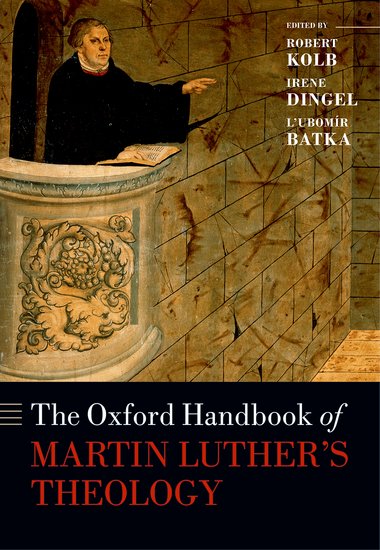 Oxford University Press has published (April 2014) The Oxford Handbook of Martin Luther’s Theology, in its series of “Handbooks” to aid study of a wide variety of subjects. Editors of this Handbook include Irene Dingel, co-director of the Leibniz-Institut für Europäische Geschichte (heading its Department of Western Church History) in Mainz, Germany, and professor of church history and history of dogma in the Evangelical Theological Faculty of the Johann Gutenberg University, Mainz; L’ubomír Batka, dean of the Lutheran theological faculty and docent of systematic theology at the Comenius University, Bratislava, Slovakia; and Robert Kolb, missions professor of systematic theology at Concordia Seminary, Saint Louis.
Oxford University Press has published (April 2014) The Oxford Handbook of Martin Luther’s Theology, in its series of “Handbooks” to aid study of a wide variety of subjects. Editors of this Handbook include Irene Dingel, co-director of the Leibniz-Institut für Europäische Geschichte (heading its Department of Western Church History) in Mainz, Germany, and professor of church history and history of dogma in the Evangelical Theological Faculty of the Johann Gutenberg University, Mainz; L’ubomír Batka, dean of the Lutheran theological faculty and docent of systematic theology at the Comenius University, Bratislava, Slovakia; and Robert Kolb, missions professor of systematic theology at Concordia Seminary, Saint Louis.
Two of Kolb’s colleagues, Erik Herrmann and Robert Rosin, both professors of historical theology at Concordia Seminary, Saint Louis, and doctoral candidate Joseph Tom Omolo, professor systematic theology at Neema Lutheran College in Matonga, Kenya, joined him in contributing essays to the volume. Herrmann wrote the essay, “Luther’s Absorption of Medieval Biblical Interpretation and His Use of the Church Fathers;” Rosin wrote on “Humanism, Luther, and the Wittenberg Reformation;” and Omolo wrote on “Luther in Africa.” Kolb authored the essay, “Luther’s Hermeneutics of Distinctions: Law and Gospel, Two Kinds of Righteousness, Two Realms, and Freedom and Bondage.”
Forty-four authors from sixteen nations contributed forty-seven essays to the 662-page volume. It contains a brief biographical introduction, followed by sections on “The Medieval Background and Origins of Luther’s Thought,” “The Hermeneutical Principles that Guided Luther’s Teaching and Preaching,” “Luther’s Treatment of the Traditional Topics of Western Christian Theology,” “Luther’s View of Sanctified Living,” “The Genre in which Luther Shaped his Theology,” and “The Impact and Reception of Luther’s Thought in History and in the Twenty-first Century.” A map of Germany in Luther’s period and a glossary of terms important in the discussion of his thought aid readers.
The volume brings together three generations of scholars, those who look back on years of engagement with Reformation theology, those in mid-career whose research is poking into new corners of Luther’s massive corpus of writings, and those who are just beginning to publish results of their studies of the Wittenberg way of thinking. This, along with the spread of geographical perspectives, is designed to give readers a sense of the many conversations going on among scholars regarding the development and application of Wittenberg theology and the many perspectives from which his writings are being approached and appropriated.
Kolb commented, “There are other somewhat similar ‘companions’ or ‘handbooks’ to guide new students of Luther’s thought into the writings of the Reformer himself as well as the massive scholarship on most aspects of his life and theology. Oxford University Press determined that this volume would focus simply on his thinking and its impact. Interest in late medieval and early modern European history in general is not as strong as it once was in other parts of the world, but interest in Luther’s way of thought is growing, especially in the expanding churches of the Majority World but also in the cultures surrounding them. The editors hope that the essays in this volume will help those not so familiar with aspects of Luther’s way of viewing reality to enter into his writings and his thinking.”
Kolb added, “The authors of these essays are still in this generation overwhelmingly Western European and North American. It is our hope that in the future a new group of Reformation scholars will arise out of Asia, Africa, and Latin America. Fascination with Luther and whose application of his thought to their own situations is growing rapidly in the Majority World. That will open up new vistas into how to convey his thinking into new cultural situations addressing new societal problems.”
Copies of this Handbook may be ordered at the Oxford University Press website, www.oup.com/us.

Leave a Reply
You must be logged in to post a comment.